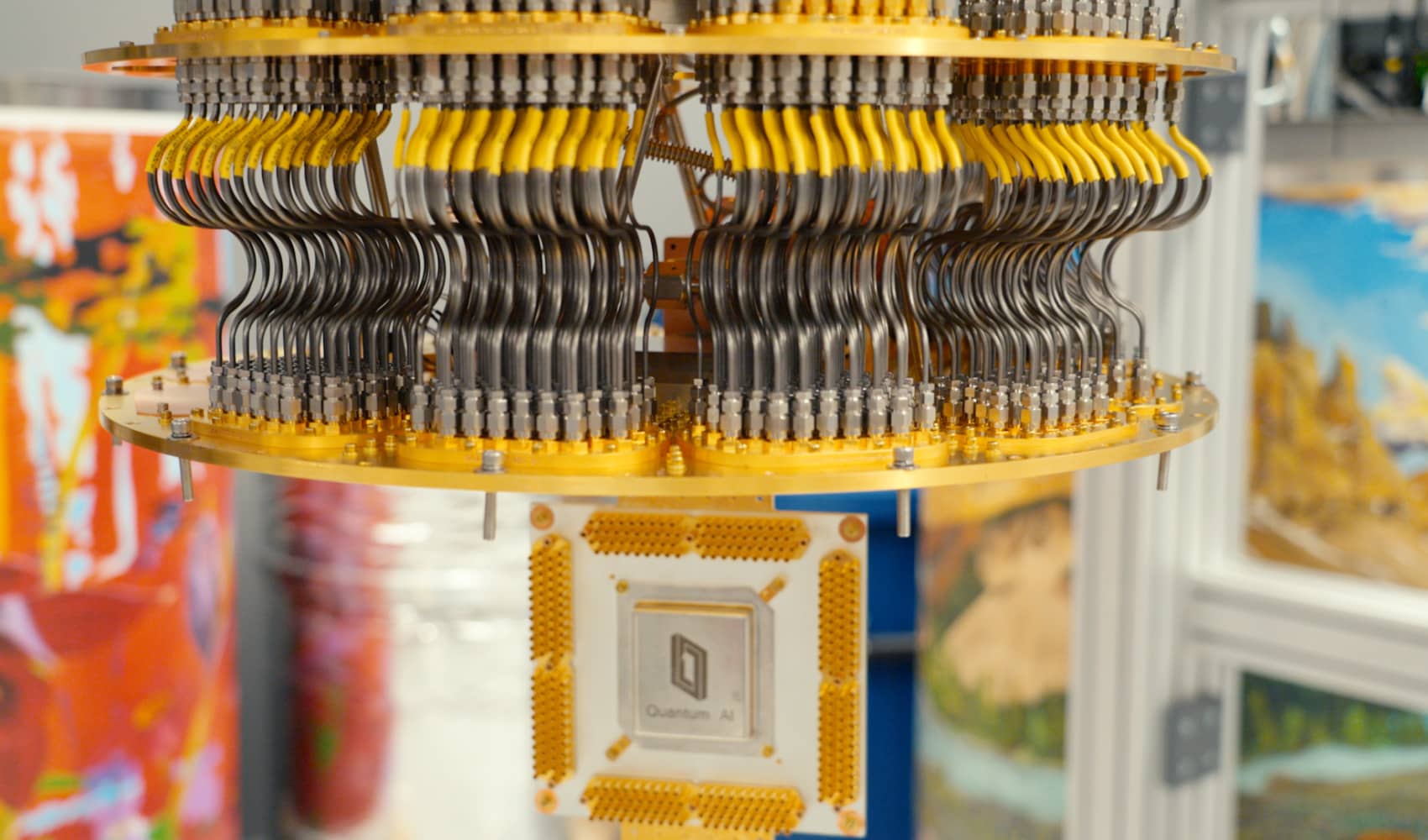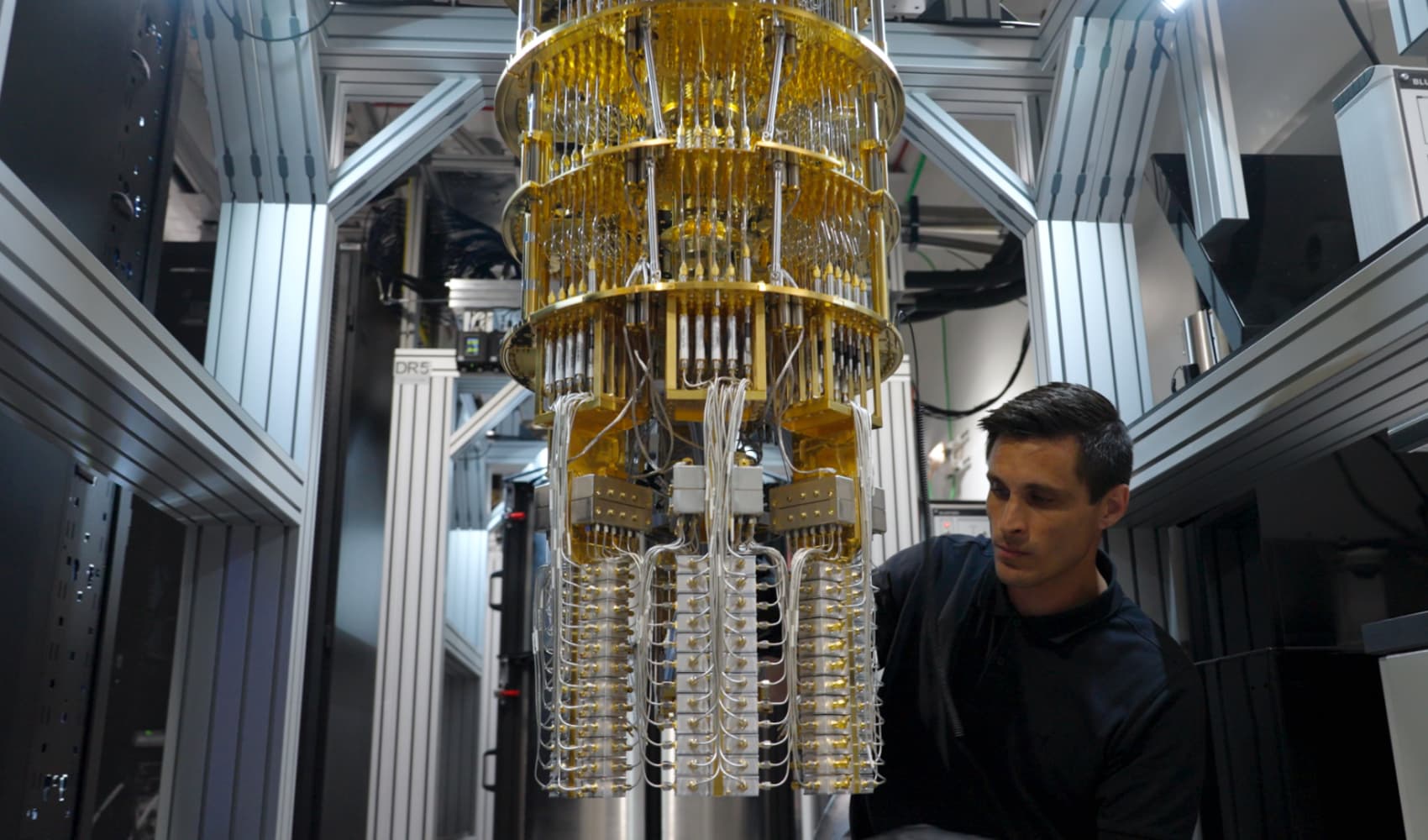Quantum Google AI: How It Will Revolutionize the Future
Quantum Leap: How Google Plans to Dominate AI with Quantum Computing
Introduction: A Quantum Revolution in AI?
Imagine a world where artificial intelligence can solve problems currently beyond our wildest dreams. That's the promise of quantum computing. And who's making a big bet on this future? Google. Deep inside a cluster of unassuming buildings in Santa Barbara, California, scientists at Alphabet are toiling away, striving to build the world's most advanced quantum computers. Are they just chasing a technological pipe dream, or are they on the cusp of a paradigm shift that will reshape the future of AI? Let's dive in and explore how quantum computing could be the secret weapon that supercharges Google's AI ambitions.
The Quantum-AI Symbiosis: A Powerful Partnership
"In the future, quantum and AI, they could really complement each other back and forth," says Julian Kelly, director of hardware at Google Quantum AI. This isn't just wishful thinking; it's a glimpse into a future where these two cutting-edge technologies work in harmony. But how exactly can quantum computing and AI benefit each other?
Harnessing Quantum Speed for AI Training
One of the biggest bottlenecks in AI development is the sheer amount of computational power required to train complex models. Quantum computers, with their ability to perform calculations that are impossible for classical computers, could drastically accelerate the training process. Think of it like this: training a massive AI model on a classical computer is like driving across the country on a bicycle, while using a quantum computer is like teleporting.
Unlocking New AI Algorithms with Quantum Mechanics
Quantum mechanics offers entirely new approaches to computation, which could lead to the discovery of novel AI algorithms. Imagine AI models that are not just faster and more efficient, but also capable of learning and reasoning in fundamentally different ways. Quantum machine learning could unlock patterns and insights that are currently hidden from us.
Google's Quantum Gambit: Playing Catch-Up and Pushing Forward
Google, despite being a tech giant, has been perceived by many as a bit late to the generative AI party, especially with OpenAI's ChatGPT stealing the spotlight in late 2022. But Google is not one to stay down for long.
The Willow Chip: A Quantum Breakthrough
Late last year, Google signaled loud and clear that it wasn't going to be left behind. The company unveiled a groundbreaking quantum computing chip named Willow. What makes Willow so special? Google claims that it can solve a benchmark problem unimaginably faster than any classical computer could, demonstrating that adding more quantum bits (qubits) to the chip dramatically reduces errors. This is a huge leap forward in making quantum computers more practical and reliable.
Beyond Willow: Google's Long-Term Quantum Vision
Willow is just one piece of the puzzle. Google has a comprehensive long-term vision for quantum computing that goes far beyond solving simple benchmarks. They are investing heavily in research and development, building a complete quantum ecosystem that includes hardware, software, and algorithms. Are they aiming to create the "quantum operating system" of the future? It certainly seems that way.
Quantum Computing Explained: Demystifying the Quantum Realm
Quantum computing can sound like science fiction, but it's based on real scientific principles. Let's break down some key concepts in a way that's easy to understand.
Qubits: The Building Blocks of Quantum Power
Unlike classical computers that use bits to represent 0 or 1, quantum computers use qubits. A qubit can exist in a state of 0, 1, or a superposition of both simultaneously. Think of it like a coin spinning in the air – it's neither heads nor tails until it lands. This superposition allows quantum computers to explore many possibilities at once, giving them their extraordinary computational power.
Quantum Entanglement: Spooky Action at a Distance
Another key concept is quantum entanglement. When two qubits are entangled, their fates are intertwined, no matter how far apart they are. If you measure the state of one entangled qubit, you instantly know the state of the other. Einstein famously called this "spooky action at a distance," and it's a fundamental property of quantum mechanics that enables powerful quantum algorithms.
Quantum Superposition and Quantum Entanglement
So, imagine having several coins spinning simultaneously, not just one. Now imagine that when one coin finally lands, all the others automatically land as well. And each of these coins is a qubit which, along with entanglement, is the secret to how quantum computers can solve the really, really hard stuff.
The Challenges Ahead: Quantum Computing's Roadblocks
Despite the excitement, quantum computing is still in its early stages. There are significant challenges that need to be overcome before it can truly revolutionize AI.
Quantum Decoherence: The Fragility of Qubits
Qubits are incredibly sensitive to their environment. Any external disturbance, such as heat or electromagnetic radiation, can cause them to lose their quantum state, a phenomenon called decoherence. Maintaining the delicate quantum state of qubits is one of the biggest technical hurdles in building practical quantum computers.
Error Correction: Taming Quantum Noise
Quantum computations are inherently noisy. Errors can creep in due to decoherence and other factors. Developing robust error correction techniques is crucial for ensuring the accuracy and reliability of quantum algorithms. The fewer the errors and the more reliably one is able to correct them the better and more useful the Quantum computer will be.
Scaling Up: Building Bigger and Better Quantum Computers
Current quantum computers have a limited number of qubits. To solve complex problems, we need quantum computers with thousands, or even millions, of qubits. Scaling up the number of qubits while maintaining their stability and coherence is a major engineering challenge. It’s one thing to have it work with 50 qubits; its completely another to have it work with 1,000,000 qubits and still be reliable.
How Quantum Computing Will Revolutionize AI
Despite the challenges, the potential rewards of combining quantum computing and AI are enormous.
Drug Discovery and Materials Science
Quantum computers can simulate the behavior of molecules with unprecedented accuracy. This could revolutionize drug discovery by allowing scientists to design new drugs and therapies more effectively. Similarly, it could accelerate the development of new materials with desired properties, such as stronger, lighter, and more energy-efficient materials.
Financial Modeling and Risk Management
Financial institutions could use quantum computers to develop more sophisticated models for predicting market trends, managing risk, and detecting fraud. Quantum algorithms could analyze vast amounts of financial data with greater speed and accuracy, leading to better investment decisions and a more stable financial system.
Optimization Problems and Logistics
Many real-world problems, such as optimizing supply chains and routing vehicles, are incredibly complex and difficult to solve with classical computers. Quantum computers could tackle these optimization problems more efficiently, leading to significant cost savings and improved logistics. Think of everything in life that requires optimization such as, manufacturing, delivery services, or staffing in retail stores.
The Ethical Considerations of Quantum-Powered AI
As with any powerful technology, quantum computing and AI raise important ethical considerations.
Bias and Fairness
AI models are only as good as the data they are trained on. If the training data is biased, the resulting AI model will also be biased, potentially leading to unfair or discriminatory outcomes. Quantum computing could amplify these biases if not carefully managed. It’s like what they say about garbage in and garbage out; except you are supercharging the processing power.
Security and Privacy
Quantum computers could potentially break many of the encryption algorithms that currently protect our data. This could have serious implications for security and privacy. At the same time, quantum technologies could also offer new ways to protect our data, such as quantum cryptography. The race is on.
The Future is Quantum: What to Expect in the Coming Years
Quantum computing is still in its infancy, but the pace of progress is accelerating. What can we expect to see in the coming years?
Increased Investment and Collaboration
Governments and private companies are investing heavily in quantum computing research and development. We can expect to see increased collaboration between academia, industry, and government to accelerate the development of quantum technologies. It’s such a big opportunity that any players are coming to the table.
The Rise of Quantum-as-a-Service
As quantum computers become more accessible, we can expect to see the emergence of quantum-as-a-service platforms. These platforms will allow researchers and developers to access quantum computing resources remotely, without having to invest in their own hardware. The potential for cloud-based quantum access is a huge opportunity.
Conclusion: A Quantum Future Powered by Google?
Google's ambitious quantum computing program is a testament to the company's commitment to pushing the boundaries of technology. While the challenges are significant, the potential rewards are enormous. If Google succeeds in building a practical quantum computer, it could revolutionize AI and unlock solutions to some of the world's most pressing problems. The quantum revolution is coming, and Google is positioning itself to be at the forefront. Whether or not they become the leader in Quantum AI remains to be seen but they are certainly putting in the effort.
Frequently Asked Questions
Q1: What exactly is quantum computing?
Quantum computing uses the principles of quantum mechanics to perform calculations in a fundamentally different way than classical computers. Qubits, superposition, and entanglement enable quantum computers to solve certain problems much faster.
Q2: How is quantum computing different from classical computing?
Classical computers use bits that represent either 0 or 1. Quantum computers use qubits that can represent 0, 1, or a superposition of both simultaneously. This allows quantum computers to explore many possibilities at once, making them much faster for certain types of calculations.
Q3: Why is quantum computing important for AI?
Quantum computing can accelerate the training of AI models, enable the discovery of new AI algorithms, and solve optimization problems that are currently intractable for classical computers. This could lead to more powerful and efficient AI systems.
Q4: What are the biggest challenges facing quantum computing?
The biggest challenges include quantum decoherence (the loss of quantum state), error correction, and scaling up the number of qubits while maintaining their stability. Effectively, the computer must be so well isolated that outside interference doesn’t corrupt the calculation.
Q5: When will quantum computers be widely available?
It's difficult to predict exactly when quantum computers will be widely available, but most experts believe it will take several years, or even decades, to overcome the current technical challenges. However, progress is being made rapidly, and we can expect to see increasingly powerful quantum computers in the coming years.

